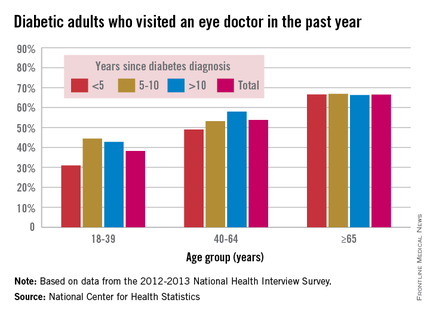Adults younger than 40 years old who have diabetes were much less likely to have recently seen an eye doctor than were older adults during 2012-2013, especially if they had been diagnosed less than 5 years earlier, according to a report from the National Center for Health Statistics.
Among adults aged 18-39 years who had been diagnosed with diabetes in the previous 5 years, 31% had seen an eye doctor in the previous year, compared with 49% of adults aged 40-64 and about 67% of adults 65 and older. About 44% of 18- to 39-year-olds diagnosed 5-10 years earlier reported seeing an eye doctor recently, and just under 43% of 18- to 39-year olds diagnosed more than 10 years prior reported seeing an eye doctor in the past year, the researchers noted.
Adults aged 40-64 years who had been diagnosed more than 10 years prior were significantly more likely to have seen an eye doctor recently (58%) than were those diagnosed between 5 and 10 years earlier (53%). In adults 65 and older, between 66% and 67% had seen an eye doctor recently in all diagnosis groups, according to the report.
“Among adults with diabetes, both age and years since diagnosis may play a role in visiting an eye doctor in the past 12 months. However, the findings here show that the association between years since diagnosis and visiting an eye doctor in the past year may only hold for certain age groups, specifically adults aged 40-64,” wrote the NCHS researchers.
The NCHS used data collected for the 2012-2013 National Health Interview Survey.


